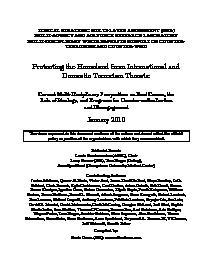Protecting the Homeland from International and Domestic Terrorism Threats : Current Multi-Disciplinary Perspectives on Root Causes, the Role of Ideology, and Programs for Counter-radicalization and Disengagement
Prison and Community Based Disengagement and De-Radicalization Programs for Extremists Involved in Militant Jihadi Terrorism Ideologies and Activities. STRATCOM Protecting the Homeland from International and Domestic Terrorism Threats: Current Multi-Disciplinary Perspectives on Root Causes, the Role of Ideology, and Programs for Counter-Radicalization and Disengagement.
Preface (Brigadier General Raymond A. Thomas III)
If there are any key insights resulting from renewed study of the causes and potential solutions for terrorism, it is that there is no simple formula for either the individual or group radicalization phenomenon. While epidemiology and law enforcement provide useful insights on terrorism, they fall short in recognizing the inherent complexity of what is fundamentally a system-of-systems problem. That is, stopping or abating the terrorism phenomenon is not merely an issue of identifying and intercepting the perpetrators of terrorist violence. To be truly effective, strategies and tactics must also be focused far to the left, to address the factors that lead to radicalization in the first place. These efforts should span the perpetrators, the instigators, and the population that both actively and passively supports terrorism (the oft referenced "green layer"). These dynamics occur and inter-relate across many levels. For example, terrorist groups can in some cases gain the support of others by providing public services (e.g., water, medical care), often filling critical gaps where the government is failing to fulfill basic needs. Any strategies to decrease terrorism-related violence need to be tailored to address all the elements of this system-of-systems. Successful counter-radicalization strategies include programs that target entire communities, especially targeting the vulnerable segments -- the unemployed, the disenfranchised, and the youth (especially under 25 year old males). Social connectedness is a powerful factor, even if one is connected to another's struggle. Successful deradicalization/rehabilitation programs generally include the family of the perpetrator, enlisting them to ensure compliance as well as including them in financial compensation, etc. In short, addressing a complex and multi-faceted problem requires a multi-faceted solution.
Geachte bezoeker,
De informatie die u nu opvraagt, kan door psychotraumanet niet aan u worden getoond. Dit kan verschillende redenen hebben,
waarvan (bescherming van het) auteursrecht de meeste voorkomende is. Wanneer het mogelijk is om u door te verwijzen naar de bron
van deze informatie, dan ziet u hier onder een link naar die plek.
Als er geen link staat, kunt u contact opnemen met de bibliotheek,
die u verder op weg kan helpen.
Met vriendelijke groet,
Het psychotraumanet-team.
379 | Washington, DC: White Papers, Strategic Multi-Layer Assessment and Air Force Research Laboratory.
https://www.start.umd.edu/sites/default/files/files/publications/U_Counter_Terrorism_White_Paper_Final_January_2010.pdf


